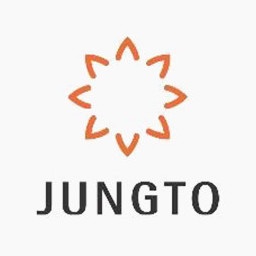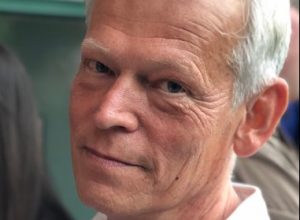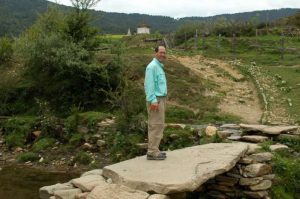
The Korean Seon (Zen) master Venerable Pomnyun Sunim (법륜스님) wears many hats: Buddhist monk, Dharma teacher, author, environmentalist, social activist, and podcaster to name a few. As a widely respected Dharma teacher and a tireless social activist in his native South Korea, Ven. Pomnyun Sunim has founded numerous Dharma-based organizations, initiatives, and projects that are active across the world. Among them, Jungto Society, a volunteer-based community founded on the Buddhist teachings and expressing equality, simple living, and sustainability, is dedicated to addressing modern social issues that lead to suffering, including environmental degradation, poverty, and conflict.
A regular speaker at public venues such as community centers, libraries, universities, and churches, Ven. Pomnyun Sunim is renowned for his sharp and insightful Dharma dialogues, offered free of charge and expressed in everyday terms for the average layperson, with the aim of sharing his Dharmic message of happiness and freedom with people from all walks of life, backgrounds, ages, and religious affiliations. He extends his reach to audiences and practitioners around the world through YouTube videos, podcasts, and live-streamed events.
This article is the first in a new series of essays sharing some notable highlights from Ven. Pomnyun Sunim’s activities and regular live-streamed Dharma Q+A sessions, which are accessible across the globe in response to the COVID-19 pandemic.
Q: I’m a resident of Sydney, Australia, suffering through lockdown due to COVID-19. We’ve been in lockdown for about 10–12 weeks and sometimes it’s really difficult. I suffer from stress and increased sensitivity to clutter and noise, and I feel more anxious generally. Sometimes I notice that going outside for running or exercise helps, but it’s not always possible. I live in a small space with my partner and while I don’t have any doubts about our love for each other, sometimes it can feel a little tense and I don’t know how to deal with that. So my question today is how can we deal with these lockdown symptoms, especially when confined in a small space.
Venerable Pomnyun Sunim: Come and join me in doing farm work! [laughter]
Q: I’d love to, but we can’t travel!
VPS: It’s only natural for us to feel uncomfortable because our living environment has changed since the outbreak of COVID-19. The discomfort we feel in turn leads to stress. When we return to life as it was before the pandemic, most of our stress will be resolved. But the question is: what if we can’t return to life as it was before the pandemic? Do we have to live with stress or can we live without stress in the changed environment? This is the choice we have.
Let me give you an example. Let’s say your staple food is bread. But you’ve relocated to Korea and it’s hard to buy bread. So you have to eat rice, but you don’t like it. You feel stressed by the food. What should you do? Should you go back home? But you are in a situation that requires you to live in Korea. Then the question becomes whether you will live with stress or without stress.
Why do we become stressed in such situations? Most of us think that it’s because of the food, but actually it’s not. Our feelings of stress come from our habits.
If the stress came from food, Koreans who eat rice everyday should feel stressed as well. But actually what happens is that your habit of eating bread every day creates resistance to a situation that forces you to eat rice. There are two ways to avoid stress in such situations: first, you can continue to follow your customary habits and buy bread to eat. Second, you can adjust your palate to suit the situation in which you have to eat rice.
Changing one’s karma is not easy. However, spiritual practice enables us to attain freedom by changing our karma. It’s the same with the clothing we wear. In primitive times, humans didn’t wear clothes. When humans first began wearing clothes, they must have felt very uncomfortable. But as they continued wearing clothes, they adjusted to it, and now not wearing clothes feels strange.
It’s the same for face masks. If one wears a mask from childhood, it will feel like a piece of clothing. Not wearing one will feel like something is missing. We are not used to wearing face masks, so wearing one can feel stuffy and uncomfortable. So the discomfort doesn’t come from the mask but from our habit.
I grew up in a rural area where there were few bathing facilities. In the summer, we bathed in the stream, but in the winter we hardly ever washed. Parents telling their children to bathe and children refusing to bathe was a major source of conflict for families then. But things are different now. We all wash ourselves everyday, so skipping a shower or a bath even for a day makes us feel uncomfortable. So if we were suddenly unable to bathe for a month, how uncomfortable would it feel? Yet the discomfort doesn’t come from not washing but from our habit.
When you feel uncomfortable, your practice should be to recognize that your discomfort comes from your habits, instead of blaming your environment or circumstances. You recognize that “this discomfort comes from my habit” and you learn to endure it. Then, while you may still feel uncomfortable, you won’t be stressed.
So in this case there are two solutions for you: first, you can relieve your stress by traveling on weekends. This is a way to satisfy your needs based on your habits. If you apply this solution to the bread example above, you can refresh yourself by occasionally eating bread.
However, a true practitioner recognizes that discomfort comes from their resistance to karma and not from the pandemic, and so doesn’t become stressed about being unable to go outside. If you can recognize that the discomfort comes from your karma, you won’t feel uncomfortable even if you can’t go outside all day. Before the pandemic, we used to go to a meditation retreat center and engage in meditation in a confined area for a week, didn’t we? Try to change your perception of the current situation and think: “I am at a meditation center.” [laughter]
The fact that you are under stress means that you are losing to the virus. Do the things that you can do under the given circumstances. Do housework, meditate, and find ways to live freely under your circumstances.
Jungto Society had more than 170 Dharma centers in Korea. At the beginning of the pandemic, we closed the centers when the number of COVID-19 cases increased and we re-opened them when the number of infections decreased. We had to open and close as the virus dictated. I asked an expert: “When will the pandemic end?” He replied: “It won’t end easily.” He said that this pandemic will probably last for a while and the number of cases will periodically surge and subside. So Jungto Society held some meetings and we decided to move our practice online. Many Jungto Society members had worked hard to establish and operate our Dharma centers and so everyone felt sad about closing them. So I told them:
Would you keep the body of your loving wife or husband when she or he dies? No matter how much you loved them, you have to bury or cremate them when they die. Likewise, even if you put a lot of money and effort into the Dharma center, it has to go if it’s no longer useful.
And the members understood and accepted my recommendation. As a result, all of our Dharma centers were closed within six months from the decision to go online. Now, Jungto Society can continue to hold online Dharma meetings regardless of the pandemic situation.
So you might move to the countryside, change your job, change the way you work, or you might think: “I am at a meditation center” while you’re staying at home. It is perfectly all right for you to choose any of these. You become stressed because you are attached to your habits. Therefore, the Buddha said: “It is better to conquer yourself than to win a thousand battles.” To conquer oneself means to become free from one’s karma, desires, and propensities.
When you become stressed, it is your loss. No one gave you stress. You are suffering because you are shackled by your karma. The government restricts people’s movements to curb the spread of the novel coronavirus. So people have to accept these restrictions because they are aimed at preventing greater loss.
Q: Thank you very much, this was very helpful!
See more
Pomnyun
Jungto Society
JTS Korea
JTS America
International Network of Engaged Buddhists
Related features from Buddhistdoor Global
The Hungry Should Eat: JTS Brings Buddhist Compassion and Relief to India
Engaged Buddhism: Seon Master Pomnyun Sunim Pledges 10,000 Tons of Food Aid for Children in North Korea
Engaging with Suffering, Realizing Freedom: An Interview with Ven. Pomnyun Sunim
Related news reports from Buddhistdoor Global
Engaged Buddhism: Ven. Pomnyun Sunim Delivers Compassion to the Vulnerable in Korea
Engaged Buddhism: Jungto Society Delivers Compassion for the Vulnerable in Korea
Engaged Buddhism: JTS Korea Distributes Emergency Flood Relief in Cambodia
Engaged Buddhism: JTS Korea Donates COVID-19 Relief Supplies to Myanmar in Cooperation with INEB and KMF
Engaged Buddhism: Jungto Society Sharing the Gift of Compassion this Winter
UPDATE: Buddhist Relief from JTS Korea Transforming the Lives of Rohingya Refugees
Engaged Buddhism: JTS Korea Brings Warmth to Vulnerable Communities amid Winter Freeze












